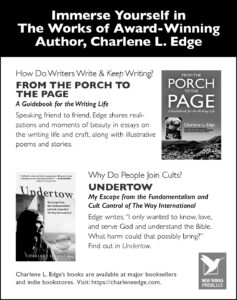
Greetings, readers. I interrupt our series on Caring for Mother Nature to share some thoughts about a topic near and dear to my heart: critical thinking. For me, it’s a vital skill I aim to exercise, like a muscle, as well as I can. How about you? Keep reading to find out why this matters to me so much, and my recommendation of a book that’s helped me with critical thinking.
Why critical thinking matters to me
In my view, critical thinking is like a muscle that needs exercise to keep our minds well. I gained some experience with this when I broke out of the indoctrination and undue influence of a cult leader. If you’re reading this, you probably know I wrote a book about that: Undertow: My Escape from the Fundamentalism and Cult Control of The Way International.
My capacity to think critically became a major help when, at The Way headquarters in Ohio, I made a serious effort to think for myself. I quit being so passive and accepting of whatever the cult leader, Victor Paul Wierwille (founder of The Way) and other Way leaders he trained, like Craig Martindale, insisted was true.
That particular time was nerve-wracking because Wierwille followers had been fed the lie that questioning “The Word” (Wierwille’s bible teachings) meant the Devil was at work in our minds. Talk about awful!
Today, Wierwille is dead. He died in 1985, and Martindale, The Way’s second president, was ousted in 2000 after two sexual misconduct lawsuits were settled out of court.
How critical thinking helped me at The Way
From evidence I witnessed working in The Way’s biblical research department, I saw how many of Wierwille’s truth-claims did not hold water. In Undertow, I describe some. For instance, one of his assumptions that I questioned was this: the whole Bible had to fit together like a hand in a glove. In other words, no contradictions could be in the original “bible” because God was the author and “He” is perfect, and could not contradict himself. That assumption depends on certain beliefs about the texts of Scripture. It is not provable with evidence. There’s more to this subject, but it’s beyond the scope of this post.
Many other assumptions Wierwille made in his bible courses came to my attention, and I began the long process of examining them, too. All that questioning made me feel as if I were pulling a loose thread at the end of a sweater sleeve. Over time, I watched the whole sweater unravel before my eyes. What did I discover then? That I could live without Wierwille’s indoctrination. I gradually knit a new sweater, so to speak.
With the help of critical thinking, supportive friends, and emotional healing, I embarked on creating a new life. My choices are personal, and not suitable for everyone. I’m not saying everyone should believe or act as I do. That is cultish thinking. I’m just saying examining your beliefs and actions and those of others is an important part of life, especially when you realize your life isn’t working out so well, and you need a change.
Note: Unfortunately, people born to parents who were/are wrapped up in The Way sometimes have a harder time escaping The Way’s undue influence than people who were/are recruited later in life. For anyone leaving The Way or another high-control group, I suggest contacting The International Cultic Studies Association.
Resource on critical thinking
Now, after sharing why this topic is important to me, I’ll share brief highlights with you about critical thinking from a helpful book by Stephen D. Brookfield: Developing Critical Thinkers: Challenging Adults to Explore Alternative Ways of Thinking and Acting. 2010.
To read Brookfield’s bio, click here.
What do we do when we think critically?
“When we become critical thinkers we develop an awareness of the assumptions under which we, and others, think and act.” (Brookfield’s Preface)
That sentence rings true for me, like a bell tolling twelve times at high noon. For instance, when I began to question assumptions Wierwille built his cult on, I gradually gained clarity about what I’d been wrapped up in for all those years. I also examined memories about why I jumped into the cult to begin with, how Wierwille and his followers manipulated me, and how I fell into denial in order to continue sticking with the group for so long.
I also learned to pay more attention to who I was and what sorts of people I should or should not hang around with, what kinds of organizations were helpful to me, which folks had my best interest in mind when they suggested I take a course of action.
I learned to spot manipulative tactics people use to get what they want from me or persuade me to “obey” them. Nothing about that was easy, nor did I do it perfectly. But I gave it my best shot then, and try to exercise critical thinking now in my day-to-day life. It’s hard, time-consuming work, but worth it to me, because I desire to be as healthy in every way as I can.
“We learn to pay attention to the context in which our actions and ideas are generated. We become skeptical of quick-fix solutions, of single answers to problems, and of claims to universal truth. We also become open to alternative ways of looking at, and behaving in, the world.” (Brookfield’s Preface)
I wish I could put the above sentences from Brookfield in blinking neon lights! Red ones!
Four components of critical thinking
Tricia Foster, an English Department faculty member at Miami Dade College in Florida, was published as a Guest Columnist not long ago in our local paper, The Orlando Sentinel. She cited Brookfield’s work on this topic, and after I read her article I bought his book. In her article, she wrote that back in 1987, Brookfield presented these four components of critical thinking:
- Identifying and challenging assumptions, not only in others, but also in yourself
- Challenging context, the circumstances that form an event, statement, or idea
- Being able to imagine alternatives, acknowledging that there is more than one right answer
- Questioning what we hold to be universal truths
She adds, “Note that these components do not include a dismissive attitude.”
I hope you find this little list as a huge help in your everyday life. I do. No one thinks critically one hundred percent of the time, nor does it perfectly, but if we’re aware of how to do it, and we practice, we can get better and better at it.
Critical thinking: needed for a healthy democracy
“Developing critical thinkers is a complex but vital activity. It entails facing up to ethical dilemmas whose resolution is only partial and ambiguous at best. Developing critical capacities in ourselves and others invites criticism from those who are ruffled by being asked awkward questions. It will frequently be in the interests of some dominant individuals and groups not to have people become critical thinkers. Critical questioning is the last thing those in positions of power who are autocratically seeking to retain the status quo wish to see.” (Brookfield’s book, pg. 65)
If you’d like to learn more, I suggest you find this book in the library or buy it. Just so you know, I do not receive any financial kickbacks for recommending this book or any other book.
Thanks for reading!
Your writer on the wing,
Charlene







Peggy+Lantz
Important thoughts, Charlene.
Charlene L. Edge
My college training in critical thinking meant the world to me, too, mainly in the philosophy and English literature classes I took. They gave me a chance to improve and use analytical skills. That liberal arts education I received at Rollins College, Winter Park, Florida, is invaluable.
Kathleen Brandt
More timely now than ever!
Charlene L. Edge
Agree!
Nylda Dieppa
This is an important public service
Roz
So many people need these thoughts and techniques today, and we can all benefit by being reminded. Thanks for doing so much for helping the world through your advocacy.
Charlene Edge
Here’s a helpful article about spotting misinformation online, which I find helpful. Again, being reflective and thinking takes time in this hurry-up culture, but the cost of rushing to agree with anything is pretty high, so I say let’s slow down and think more.
This article from the BBC is by Amanda Ruggeri, an award-winning science and features journalist.
She suggests what’s called the “SIFT” method:
S is for … Stop
I is for … Investigate the source
F is for … Find better coverage
T is for … Trace the claim to its original context
Here’s the link to the article:
https://www.bbc.com/future/article/20240509-the-sift-strategy-a-four-step-method-for-spotting-misinformation
Linda Goddard
Charlene,
Thank you for all you’ve shared on critical thinking! These cognitive skills are a life-line to think well, consider varied views and opinions, separate credible facts from the personal agenda-driven manipulations, from all the dangers of believing one-sided, single stories.
Again, thank you!